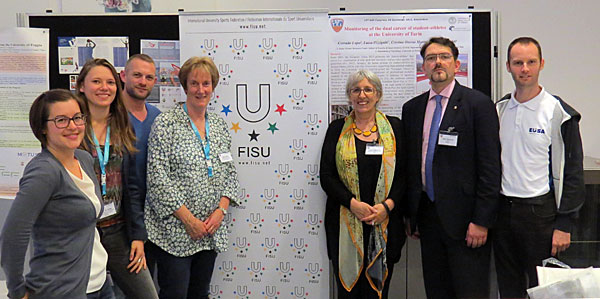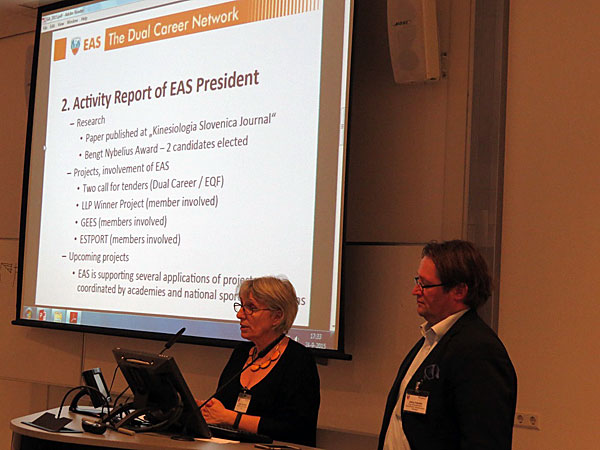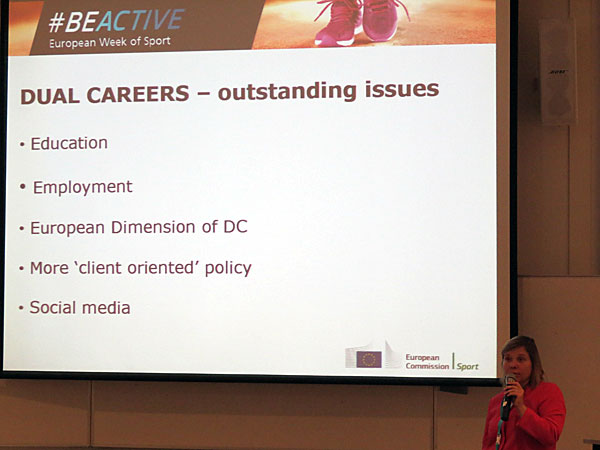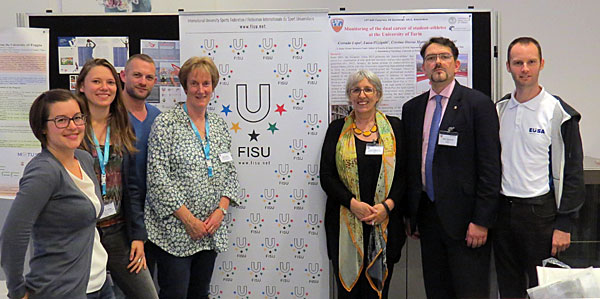AMSTERDAM – This year’s edition of the EAS Conference was held on 24-25 September at the University of Applied Sciences of Amsterdam (HvA) / School of Sports & Nutrition. The aim of the EAS (European Athlete as Student) is to develop policies, best practices, raise awareness on the necessity to offer opportunities for young people to combine athletic preparation and competition with their studies. These policies are known in Europe under the generic term of ‘Dual Career’.
 Delegates from FISU, EUSA & BUCS with EAS President Laura Capranica
Delegates from FISU, EUSA & BUCS with EAS President Laura Capranica
Laura Capranica, President of EAS and Jacomine Ravensbergen, Chair of the domain ‘Exercise, Sports and Nutrition’ of the Amsterdam University of Applied Sciences, officially opened the Conference together. Mrs. Ravensbergen stressed that the University (HvA) gains athletes by having implemented the ‘Dual Career’ programme (Top Sport) that helps the youngsters during their studies but also afterwards by leading them to the labour market. The University developed a centre of Elite Sports and Education.
It was the third time that FISU attended this event. Among the participants, a couple were directly linked to FISU, such as BUCS, our member federation in the UK, the European University Sports Association (EUSA) and the University of Trento that is becoming a leading institution for this programme in Italy after having hosted the 2013 Winter Universiade.
The presentation of Flavia Guidotti from the University of Foro Italico in Rome made a study of the actual situation regarding the number of scientific papers that are published on the specific topic of the ‘Dual Career’. How to combine sport and education when a national structure is not existing? Career transitions are a process that is dynamic, multidimensional, multilevel and multifactor. She insisted in her final remarks that the term ‘Dual Career’ is not always used to define projects that are implemented with the same aims and goals. It was very interesting as the topic has been developed only since a couple of years.
 EAS President Laura Capranica & EAS Secretary-General Jörg Förster
EAS President Laura Capranica & EAS Secretary-General Jörg Förster
The Conference was the opportunity for a number of High Education Institutions to present their own programmes such as the Catholic University of Murcia (Spain) which presentation focused on ‘Developing an innovative European Sport Tutorship model for the dual career of athletes (ESTPORT)’ or the University of Miitweida in Germany on ‘Dual Career as Educational Challenge in the European Environment of Sports’ which focused on a research project to create and implement new learning cultures.
Besides the single universities models, some other initiatives were introduced to the 70 participants of the Conference, such as the ‘Winner Education Model’ presented by Finland, ‘Twin’ by TASS, which is the organisation in charge of top-athletes in the UK or the ‘Gold in Education and Elite sport (GEES)’ presented by INSEP (France) and the University of Brussels (VUB) co-funded by the European Union in order to formulate recommendation on competences, instruments and methods to the EU and to develop minimum quality requirements at the European level. The Dutch Olympic Committee presented its programmes related to ‘Dual Career’ as well.
 Agata Dziarnowska, representing the European Commission
Agata Dziarnowska, representing the European Commission
Agata Dziarnowska, representing the European Commission, stressed that the ‘Dual Career’ is one of the priorities for the ‘Sport and Education’ programmes of the EU. She stressed that DC could be a tool for different policies such as, social inclusion, unemployment and education. She underlined the importance of the GEES study. Finally, she insisted by saying that it is an outstanding issue because it covers, education, employment, it has a European dimension but also that the policies should be more ‘client oriented’ and must involve the social media.
To summarise, all participants focused on the flexibility needed by all partners to implement such programmes, that the relations between the sport federation, the academic institutions and the entourage are crucial, that there is a lack of studies and that it is a necessity to develop requirements and models at European levels. All these aspects and the EAS activities were presented by EAS President Laura Capranica and EAS Secretary-General Jörg Förster who is also a board member of the National University Sports Federation of Germany (ADH).
(Source: Kolë Gjeloshaj, Director Educational Services)
